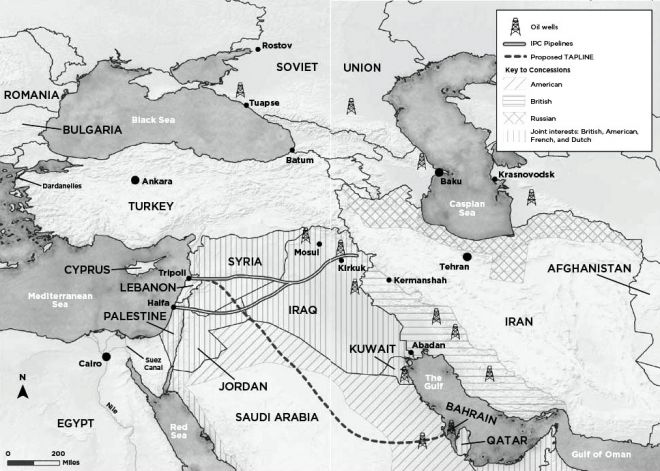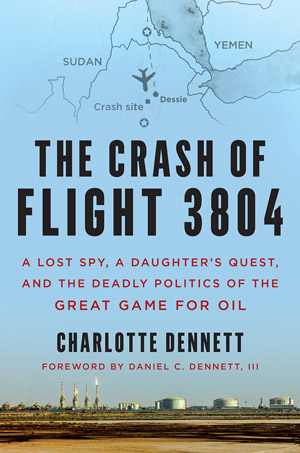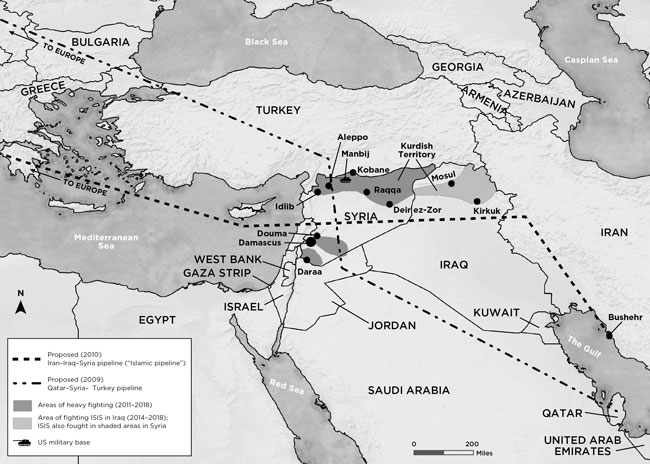Endless Wars and Sacrifice Zones: How Pipeline Politics Link Oil and Death
Published on July, 07 2020
This 1947 map shows the dotted line of a projected pipeline route of TAPLINE. It would eventually terminate in southern Lebanon, following the CIA’s first coup in 1949 overthrowing Syrian president Shukri al-Quwatly, who objected to its routing through Syria. Photo credit: Chelsea Green Publishing, used with permission.
By Charlotte Dennett
For the Earth Democracy Issue Committee
August 2020
Death has a way of awakening the consciousness of those confronting it. Today, veterans of the wars in Iraq and Afghanistan are beginning to face the ultimate question: did we sacrifice American blood and treasure for oil?
Leaders of two veterans’ groups, VoteVets and the more conservative Concerned Veterans for America, have joined forces to press for changes in war authorization measures by Congress and an examination of “why we are in endless wars.” This desire to challenge the increased power that has been given to the executive branch to wage wars has made for some strange bedfellows in Washington, DC, with veterans and congressional representatives on all sides of the political spectrum calling for more transparency with regard to US military involvement.
This is a significant development, to even consider reducing military involvement, and it comes as polling shows there is greater support among the American public to decrease military spending (especially on nuclear weapons) and direct the funds instead toward much-needed domestic programs and services.
Persistent Grassroots Organizers Claim Recent Victories
Consider also some recent, earth-shaking news: indigenous and black leaders celebrated major victories in struggles against two giant oil pipelines which, they have claimed for years, could bring endless environmental harm – even death – to their sacred lands and peoples.
On July 6, a federal judge ordered the shutdown of Energy Transfer’s Dakota Access Pipeline long fought against by the Standing Rock Sioux and their allied water protectors in North Dakota. That same week, Dominion and Duke Energy announced cancelation of the Atlantic Pipeline which was to cross West Virginia, Virginia, and North Carolina. According to a spokesman for Dominion, this move occurred as the result of “legal uncertainty that overhangs large-scale energy and industrial infrastructure development in the United States.” Let’s thank our Earth Democracy WILPF activists in North Carolina, Lib Hutchby and John Wagner, who for years worked to defeat this project.
Coupled with the Supreme Court’s rejection—the same week—of a Trump Administration effort to proceed with the long-delayed Keystone XL oil pipeline to transport oil from Canada to Nebraska, the New York Times ran a story titled: “Is This the End of New Pipelines”? According to the article, defeats of three pipeline projects “reflect increasingly sophisticated legal challenges, shifting economics and growing demands by states to fight climate change,” as well as stronger grassroots opposition.
Hovering over all of this is the scourge of climate change, causing worldwide protests against the fossil fuel industry, which has brought us extreme weather events that impact vulnerable communities of color and the poor worldwide.
A Daughter’s Quest
 In my new book, The Crash of Flight 3804: A Lost Spy, A Daughter’s Quest and the Deadly Politics of the Great Game for Oil, I began to make these links while investigating the pipeline-related death of my father. Daniel Dennett was America’s sole master spy in the Middle East (for the Central Intelligence Group, predecessor of the CIA) when his plane crashed following a top secret mission to Saudi Arabia. This was way back in 1947, when I was only six weeks old, but it has relevance to today.
In my new book, The Crash of Flight 3804: A Lost Spy, A Daughter’s Quest and the Deadly Politics of the Great Game for Oil, I began to make these links while investigating the pipeline-related death of my father. Daniel Dennett was America’s sole master spy in the Middle East (for the Central Intelligence Group, predecessor of the CIA) when his plane crashed following a top secret mission to Saudi Arabia. This was way back in 1947, when I was only six weeks old, but it has relevance to today.
My father’s mission was to determine the route of the Trans-Arabian oil pipeline. (TAPLINE — See map above.) In the mid-1940s, the United States was just emerging as a major world power due to the exclusive American concession to develop Saudi Arabia’s vast oil riches. At the heart of this development was the greatly-anticipated construction of this 1,000-mile pipeline across the Arabian Peninsula delivering Saudi Arabia’s oil to a terminal point slated to be on the eastern Mediterranean, in either Palestine or Lebanon. From there it would be shipped to Europe, its oil a major factor in the Marshall Plan and postwar recovery.
In my research, I discovered an article in the New York Times dated March 2, 1947, entitled “PIPELINE FOR U.S. ADDS TO MIDDLE EAST ISSUES; Oil Concessions Raise Questions Involving Position of Russia.” Written two weeks before the plane crash, it was my first introduction to the intrigues shaping what would become the deadly politics of the Great Game for Oil.
Pipe Dreams and Nightmares
With 12 pipeline maps in my book, I illustrate how endless wars in the Middle East and Asia, starting with George W. Bush’s invasion of Afghanistan in 2001 and Iraq in 2003, are in reality pipeline wars. Which, to my mind, raised yet another question: can we make the link between pipeline wars in the Middle East and pipeline struggles (not yet full-fledged wars) in the United States? And again, the answer is yes. The connecting link is the struggle to control and profit from energy, and the determination on the part of the fossil fuel companies to protect (as my father wrote in 1947) “the oil at all costs.”
My father died two years before that overriding mission took its first dangerous toll: In 1949, the CIA overthrew Syria’s democratically elected President Shukry al Quwatly, who resisted TAPLINE transiting through Syria because of Syrian opposition to the new state of Israel. The army chief who replaced him gave TAPLINE the go ahead, and the pipeline passed through the Golan Heights and ended up in Lebanon.
Four years later, in 1953, the CIA overthrew another democratically-elected nationalist: Iran’s Prime Minister Mohammad Mossadegh, who had nationalized Iran’s oil, and replaced him with the Shah of Iran, who opened up Iran’s oil to a consortium of Western oil companies dominated by British Petroleum (BP). Ultimately the overthrow of the Shah in 1979 led to the current regime in Iran.

Competing pipeline schemes in Syria are believed to have caused the civil war. Map created by John Van Hoesen. Used with permission of Chelsea Green Publishing.
In 2011, the CIA stepped up its efforts to undermine the Syrian regime of Bashar al Assad after he rejected a natural gas pipeline favored by the US and its allies that was to originate in Qatar and pass through Syria. Assad’s plan for an alternate “Islamic pipeline” carrying natural gas from Iran through Syria to Europe was the last straw for the West, and the beginning of the Syrian civil war.
|
|
Can We Learn From History?
These are just some of the costs of the deadly Great Game for Oil. As my book shows, protection of oil “at all costs” goes back to 1911 when Churchill, then First Lord of the Admiralty, converted the British navy’s reliance on coal (of which Britain had plenty) to a more efficient oil (of which Britain had none). He predicted Britain would have to fight on a “sea of troubles” to secure oil, and seizing Iraq during WW I became a “First Class war Aim.” Once secured, the oil needed a pipeline outlet on the Mediterranean Sea.
In 1917, Britain formally favored a Jewish homeland in Palestine with the Balfour Declaration. By 1933, the pipeline terminated in friendly, pro-European territory: Haifa, Palestine which by 1948 would be Israel, now the most heavily-armed pro-Western oil protector in the world.
You may contact Charlotte at chardennettlaw@gmail.com or by phone 802-881-1872.




